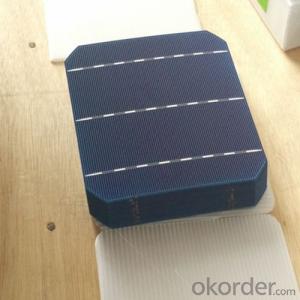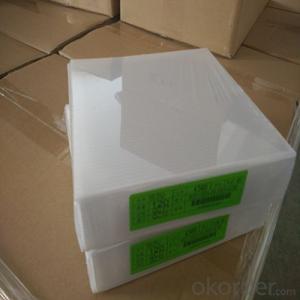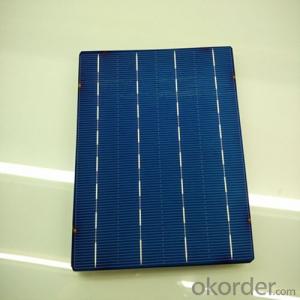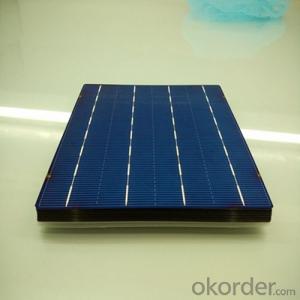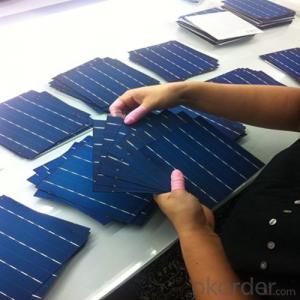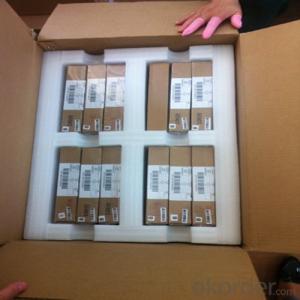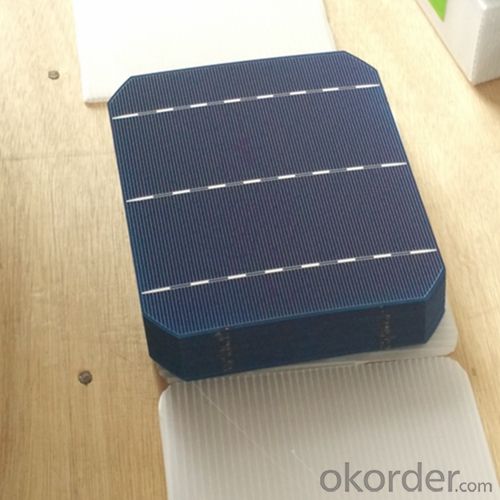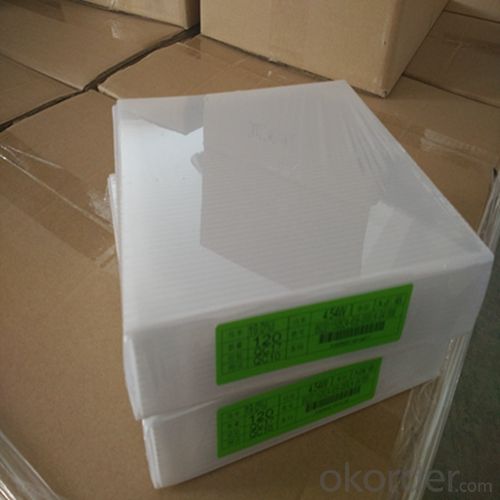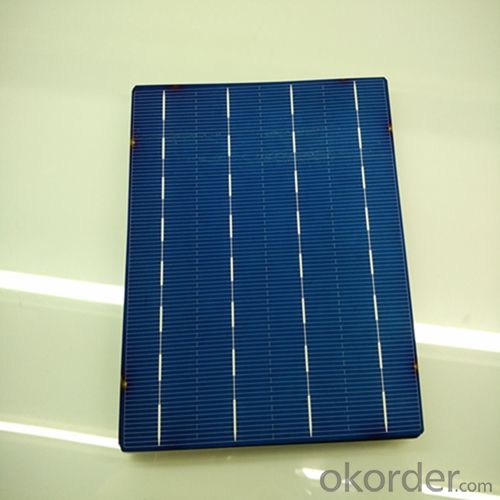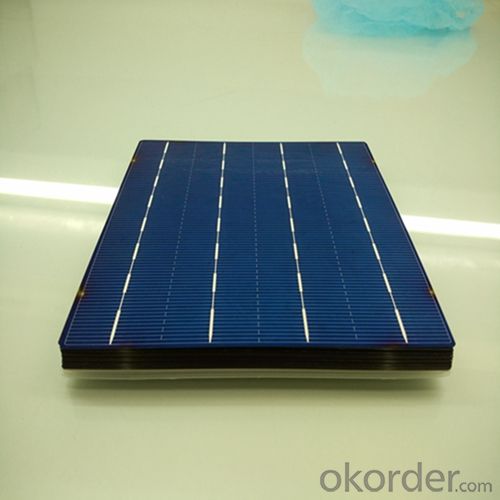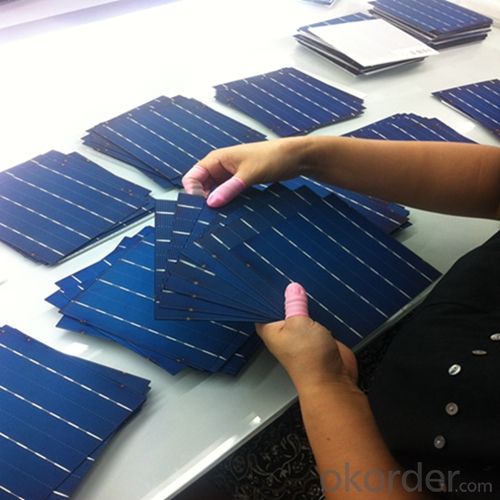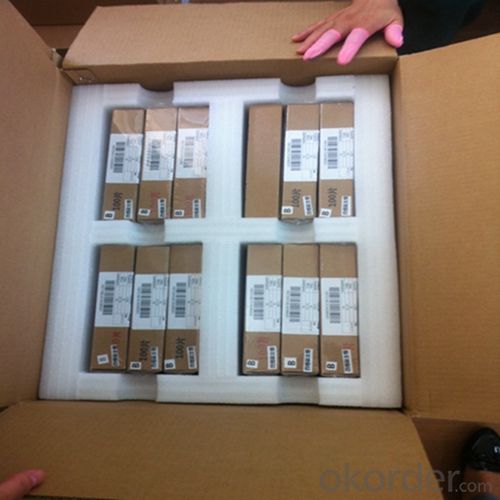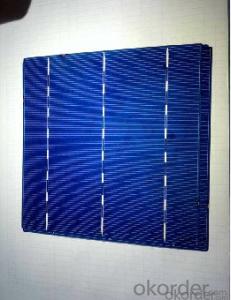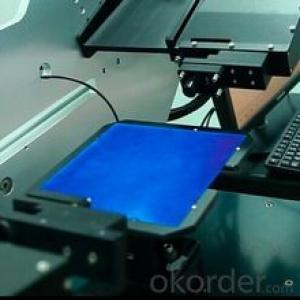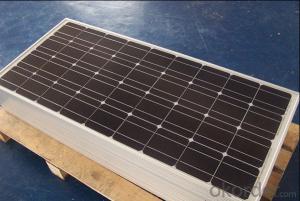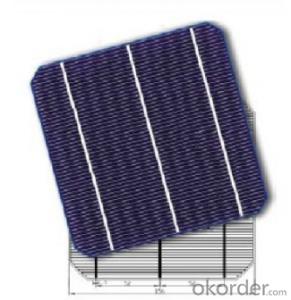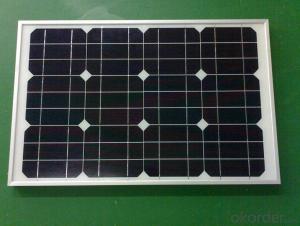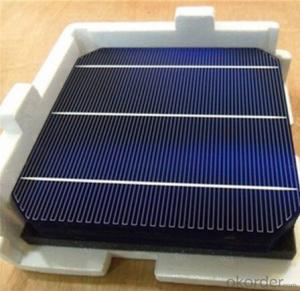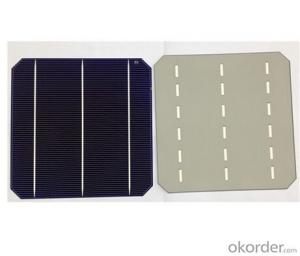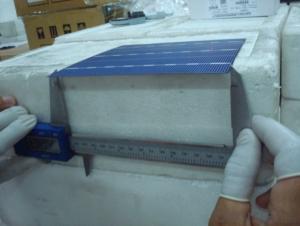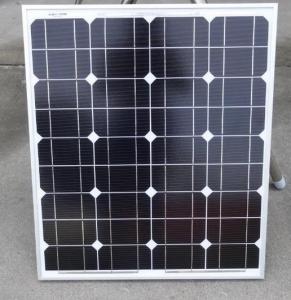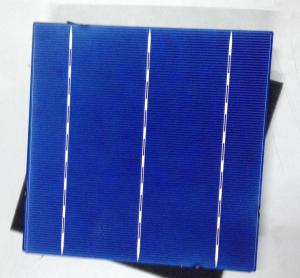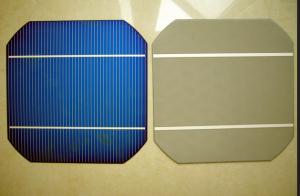Small Round Solar Cells - Mono 156x156mm2 Solar Cells Good Price
- Loading Port:
- Shanghai
- Payment Terms:
- TT OR LC
- Min Order Qty:
- 8000 watt
- Supply Capability:
- 650000 watt/month
OKorder Service Pledge
OKorder Financial Service
You Might Also Like
Benefits of Solar Power:
Now is a great time to go solar and harvest the power of the sun. Here is our top ten list of the benefits to installing solar power:
When installed, solar energy is free – no resources are consumed
Help to lessen our dependence on heavily polluting coal power stations
Fossil fuels can't last forever, future generations will appreciate the effort
Characteristic of Mono 156X156MM2 Solar Cells
You are gaining energy independence - add battery backup power for even greater energy security
The cost of electricity is only going to rise – insure against that rising cost
Quality solar power and water adds value and appeal to your home
Specifications of Mono 156X156MM2 Solar Cells
Solar PV systems are easily upgraded in future - aim to make your house a net energy producer!
Solar panels offer a long lifetime of low maintenance service, maybe 30-40 years
Your friends will think you're great!
You'll feel great for doing your bit for the environment!
Mechanical data and design
Format | 156mm x 156mm±0.5mm |
Thickness | 210μm±40μm |
Front(-) | 1.5mm bus bar (silver),blue anti-reflection coating (silicon nitride) |
Back (+) | 2.5mm wide soldering pads (sliver) back surface field (aluminium) |
Temperature Coefficient of Cells
Voc. Temp.coef.%/K | -0.35% |
Isc. Temp.coef .%/K | +0.024%/K |
Pm.Temp.coef. %/K | -0.47%/K |
Electrical Characteristic
Effiency(%) | Pmpp(W) | Umpp(V) | Impp(A) | Uoc(V) | Isc(A) | FF(%) |
18.35 | 4.384 | 0.526 | 8.333 | 0.63 | 8.877 | 78.39% |
18.20 | 4.349 | 0.526 | 8.263 | 0.63 | 8.789 | 78.54% |
18.05 | 4.313 | 0.525 | 8.216 | 0.63 | 8.741 | 78.32% |
17.90 | 4.277 | 0.524 | 8.161 | 0.625 | 8.713 | 78.04% |
17.75 | 4.241 | 0.523 | 8.116 | 0.625 | 8.678 | 77.70% |
17.60 | 4.206 | 0.521 | 8.073 | 0.625 | 8.657 | 77.36% |
17.45 | 4.170 | 0.519 | 8.039 | 0.625 | 8.633 | 76.92% |
17.30 | 4.134 | 0.517 | 8.004 | 0.625 | 8.622 | 76.59% |
17.15 | 4.096 | 0.516 | 7.938 | 0.625 | 8.537 | 76.80% |
17.00 | 4.062 | 0.512 | 7.933 | 0.625 | 8.531 | 76.18% |
16.75 | 4.002 | 0.511 | 7.828 | 0.625 | 8.499 | 75.34% |
16.50 | 3.940 | 0.510 | 7.731 | 0.625 | 8.484 | 74.36% |
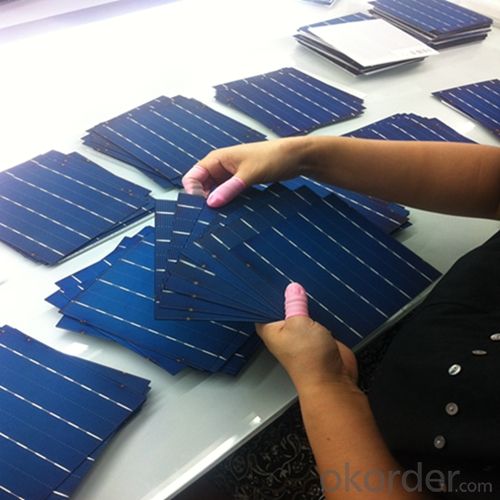
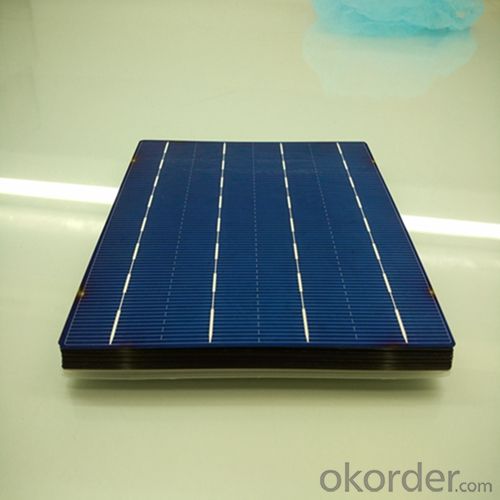
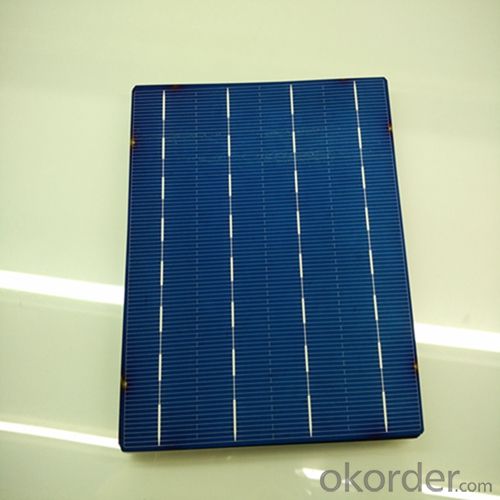
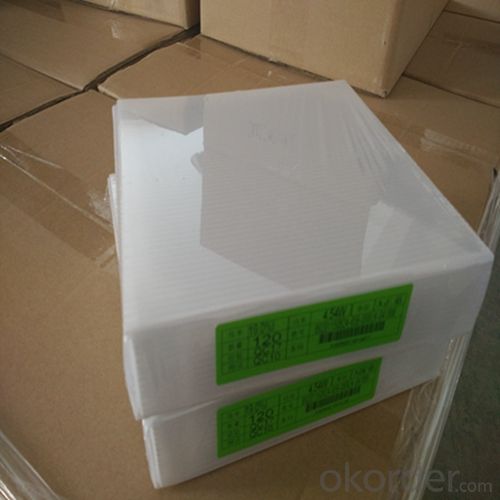
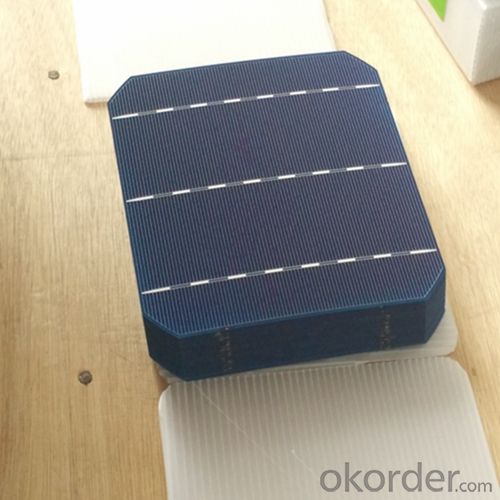
FAQ
Q: What price for each watt?
A: It depends on the quantity, delivery date and payment terms, generally Large Quantity and Low Price
Q: What is your size for each module? Can you tell me the Parameter of your module?
A: We have different series of panels in different output, both c-Si and a-Si. Please take the specification sheet for your reference.
Q: What is your size for each module? Can you tell me the Parameter of your module?
A: We have different series of panels in different output, both c-Si and a-Si. Please take the specification sheet for your reference.
- Q: Can solar cells be used in space satellites?
- Yes, solar cells can be used in space satellites. In fact, solar cells are commonly used in satellites to generate electricity from the sunlight in space. These cells convert sunlight into electrical energy, which is then used to power various systems and instruments onboard the satellite.
- Q: Can solar cells be used in underwater applications?
- Yes, solar cells can be used in underwater applications. However, special considerations need to be taken, such as using waterproof and corrosion-resistant materials, optimizing the design for low light conditions, and addressing the challenges of transmitting power and data underwater.
- Q: Can solar cells be used in military vehicles or equipment?
- Yes, solar cells can be used in military vehicles or equipment. They provide a sustainable and reliable source of energy, reducing dependency on traditional fuel supplies and enhancing operational efficiency. Solar-powered systems can be integrated into various military applications such as portable power units, communication systems, surveillance equipment, and even hybrid electric vehicles, making them more environmentally friendly and cost-effective in the long run.
- Q: What is the role of surge suppressors in solar cell systems?
- The role of surge suppressors in solar cell systems is to protect the system from voltage surges or spikes that can potentially damage the solar panels, inverters, or other components. These surge suppressors help regulate and stabilize the electrical flow by diverting excess voltage to ground, ensuring the smooth operation and longevity of the solar cell system.
- Q: How to get high voltage, high current output of solar cells
- Using 880 0.5 volt 5 amp output of the panel, 440 in series as the first group, and then get a second group, then the two groups in parallel, you can get 220 volts 10 amps output
- Q: Can solar cells be used in public transportation systems?
- Yes, solar cells can be used in public transportation systems. They can be installed on the roofs of buses, trains, and trams to generate electricity from sunlight, which can be used to power various systems such as lighting, air conditioning, and onboard electronics. This helps reduce reliance on fossil fuels and lowers the carbon footprint of public transportation. Additionally, solar cells can also be integrated into bus shelters and charging stations to provide clean energy for electric buses and other vehicles.
- Q: Can solar cells be used in agricultural settings?
- Yes, solar cells can be used in agricultural settings. They can be used to power irrigation systems, electric fences, and other equipment used in farming. Additionally, solar panels can be installed on agricultural buildings or land to generate electricity, reducing the reliance on grid power.
- Q: Can solar cells be used in space?
- Yes, solar cells can be used in space. In fact, they are extensively used in space missions to generate electricity from sunlight as there is an abundance of sunlight in space. Solar cells are a reliable and efficient source of power for spacecraft as they can convert sunlight into electrical energy without the need for fuel.
- Q: Can solar cells be used to power water pumps?
- Yes, solar cells can be used to power water pumps. Solar cells convert sunlight into electricity, which can be used to operate water pumps. This offers a sustainable and environmentally-friendly solution for powering water pumps in areas where there is no access to electricity grids.
- Q: Are solar cells affected by shade?
- Yes, solar cells are affected by shade. When solar cells are partially shaded, it reduces their efficiency and overall power output. Shading can create hotspots on the shaded cells, causing them to generate less electricity and potentially damage the cells. Therefore, it is important to ensure that solar panels are installed in areas with minimal shade to maximize their performance.
Send your message to us
Small Round Solar Cells - Mono 156x156mm2 Solar Cells Good Price
- Loading Port:
- Shanghai
- Payment Terms:
- TT OR LC
- Min Order Qty:
- 8000 watt
- Supply Capability:
- 650000 watt/month
OKorder Service Pledge
OKorder Financial Service
Similar products
Hot products
Hot Searches
Related keywords
